Wilhelm Tell, Friedrich Schiller [best ebook reader for ubuntu .txt] 📗
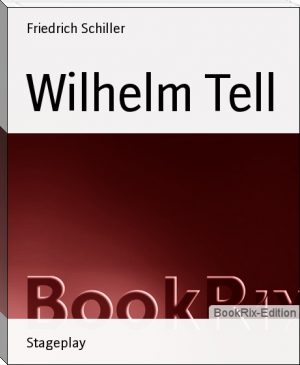
- Author: Friedrich Schiller
Book online «Wilhelm Tell, Friedrich Schiller [best ebook reader for ubuntu .txt] 📗». Author Friedrich Schiller
my passionate desires; But envy gnawed my heart - I saw the youth Of mine own cousin Leopold endowed With honor, and enriched with broad domains, The while myself, that was in years his equal, Was kept in abject and disgraceful nonage.
TELL. Unhappy man, thy uncle knew thee well, When he withheld both land and subjects from thee; Thou, by thy mad and desperate act hast set A fearful seal upon his sage resolve. Where are the bloody partners of thy crime?
DUKE JOHN. Where'er the demon of revenge has borne them; I have not seen them since the luckless deed.
TELL. Know'st thou the empire's ban is out, - that thou Art interdicted to thy friends, and given An outlawed victim to thine enemies!
DUKE JOHN. Therefore I shun all public thoroughfares, And venture not to knock at any door - I turn my footsteps to the wilds, and through The mountains roam, a terror to myself. From mine own self I shrink with horror back, Should a chance brook reflect my ill-starred form. If thou hast pity for a fellow-mortal - -
[Falls down before him.
TELL. Stand up, stand up!
DUKE JOHN.
Not till thou shalt extend Thy hand in promise of assistance to me.
TELL. Can I assist thee? Can a sinful man? Yet get thee up, - how black soe'er thy crime, Thou art a man. I, too, am one. From Tell Shall no one part uncomforted. I will Do all that lies within my power.
DUKE JOHN (springs up and grasps him ardently by the hand).
Oh, Tell, You save me from the terrors of despair.
TELL. Let go my band! Thou must away. Thou canst not Remain here undiscovered, and discovered Thou canst not count on succor. Which way, then, Wilt bend thy steps? Where dost thou hope to find A place of rest?
DUKE JOHN.
Alas! alas! I know not.
TELL. Hear, then, what heaven suggested to my heart, Thou must to Italy, - to Saint Peter's city, - There cast thyself at the pope's feet, - confess Thy guilt to him, and ease thy laden soul!
DUKE JOHN. But will he not surrender me to vengeance!
TELL. Whate'er he does receive as God's decree.
DUKE JOHN. But how am I to reach that unknown land? I have no knowledge of the way, and dare not Attach myself to other travellers.
TELL. I will describe the road, and mark me well You must ascend, keeping along the Reuss, Which from the mountains dashes wildly down.
DUKE JOHN (in alarm). What! See the Reuss? The witness of my deed!
TELL. The road you take lies through the river's gorge, And many a cross proclaims where travellers Have perished 'neath the avalanche's fall.
DUKE JOHN. I have no fear for nature's terrors, so I can appease the torments of my soul.
TELL. At every cross kneel down and expiate Your crime with burning penitential tears And if you 'scape the perils of the pass, And are not whelmed beneath the drifted snows That from the frozen peaks come sweeping down, You'll reach the bridge that hangs in drizzling spray; Then if it yield not 'neath your heavy guilt, When you have left it safely in your rear, Before you frowns the gloomy Gate of Rocks, Where never sun did shine. Proceed through this, And you will reach a bright and gladsome vale. Yet must you hurry on with hasty steps, For in the haunts of peace you must not linger.
DUKE JOHN. Oh, Rudolph, Rudolph, royal grandsire! thus Thy grandson first sets foot within thy realms!
TELL. Ascending still you gain the Gotthardt's heights, On which the everlasting lakes repose, That from the streams of heaven itself are fed, There to the German soil you bid farewell; And thence, with rapid course, another stream Leads you to Italy, your promised land.
[Ranz des Vaches sounded on Alp-horns is heard without.
But I hear voices! Hence!
HEDWIG (hurrying in).
Where art thou, Tell? Our father comes, and in exulting bands All the confederates approach.
DUKE JOHN (covering himself).
Woe's me! I dare not tarry 'mid this happiness!
TELL. Go, dearest wife, and give this man to eat. Spare not your bounty. For his road is long, And one where shelter will be hard to find. Quick! they approach.
HEDWIG.
Who is he?
TELL.
Do not ask And when he quits thee, turn thine eyes away That they may not behold the road he takes.
[DUKE JOHN advances hastily towards TELL, but he beckons
him aside and exit. When both have left the stage, the
scene changes, and discloses in -
SCENE III.
The whole valley before TELL'S house, the heights which enclose
it occupied by peasants, grouped into tableaux. Some are seen
crossing a lofty bridge which crosses to the Sechen. WALTER
FURST with the two boys. WERNER and STAUFFACHER come forward.
Others throng after them. When TELL appears all receive him
with loud cheers.
ALL. Long live brave Tell, our shield, our liberator.
[While those in front are crowding round TELL and embracing him,
RUDENZ and BERTHA appear. The former salutes the peasantry, the
latter embraces HEDWIG. The music, from the mountains continues
to play. When it has stopped, BERTHA steps into the centre of
the crowd.
BERTHA. Peasants! Confederates! Into your league Receive me here that happily am the first To find protection in the land of freedom. To your brave hands I now intrust my rights. Will you protect me as your citizen?
PEASANTS. Ay, that we will, with life and fortune both!
BERTHA. 'Tis well! And to this youth I give my hand. A free Swiss maiden to a free Swiss man!
RUDENZ. And from this moment all my serfs are free!
[Music and the curtain falls.
FOOTNOTES.
[1] The German is Thalvogt, Ruler of the Valley - the name given figuratively to a dense gray mist which the south wind sweeps into the valleys from the mountain tops. It is well known as the precursor of stormy weather.
[2] A steep rock standing on the north of Ruetli, and nearly opposite to Brumen.
[3] In German, Wolfenschiessen - a young man of noble family, and a native of Unterwalden, who attached himself to the house of Austria and was appointed Burgvogt, or seneschal, of the castle of Rossberg. He was killed by Baumgarten in the manner and for the cause mentioned in the text.
[4] Literally, the Foehn is loose! "When," says Mueller, in his History of Switzerland, "the wind called the Foehn is high the navigation of the lake becomes extremely dangerous. Such is its vehemence that the laws of the country require that the fires shall be extinguished in the houses while it lasts, and the night watches are doubled. The inhabitants lay heavy stones upon the roofs of their houses to prevent their being blown away."
[5] Buerglen, the birthplace and residence of Tell. A chapel erected in 1522 remains on the spot formerly occupied by his house.
[6] Berenger von Landenberg, a man of noble family in Thurgau and governor of Unterwald, infamous for his cruelties to the Swiss, and particularly to the venerable Henry of the Halden. He was slain at the battle of Morgarten in 1315.
[7] A cell built in the ninth century by Meinrad, Count Hohenzollern, the founder of the Convent of Einsiedlen, subsequently alluded to in the text.
[8] The League, or Bond, of the Three Cantons was of very ancient origin. They met and renewed it from time to time, especially when their liberties were threatened with danger. A remarkable instance of this occurred in the end of the thirteenth century, when Albert of Austria became emperor, and when, possibly, for the first time, the bond was reduced to writing. As it is important to the understanding of many passages of the play, a translation is subjoined of the oldest known document relating to it. The original, which is in Latin and German, is dated in August, 1291, and is under the seals of the whole of the men of Schwytz, the commonalty of the vale of Uri, and the whole of the men of the upper and lower vales of Stanz.
THE BOND.
Be it known to every one, that the men of the Dale of Uri, the Community of Schwytz, as also the men of the mountains of Unterwald, in consideration of the evil times, have full confidently bound themselves, and sworn to help each other with all their power and might, property and people, against all who shall do violence to them, or any of them. That is our Ancient Bond.
Whoever hath a Seignior, let him obey according to the conditions of his service.
We are agreed to receive into these dales no Judge who is not a countryman and indweller, or who hath bought his place.
Every controversy amongst the sworn confederates shall be determined by some of the sagest of their number, and if any one shall challenge their judgment, then shall he be constrained to obey it by the rest.
Whoever intentionally or deceitfully kills another shall be executed, and whoever shelters him shall be banished.
Whoever burns the property of another shall no longer be regarded as a countryman, and whoever shelters him shall make good the damage done.
Whoever injures another, or robs him, and hath property in our country, shall make satisfaction out of the same.
No one shall distrain a debtor without a judge, nor any one who is not his debtor, or the surety for such debtor.
Every one in these dales shall submit to the judge, or we, the sworn confederates, all will take satisfaction for all the injury occasioned by his contumacy. And if in any internal division the one party will not accept justice, all the rest shall help the other party. These decrees shall, God willing, endure eternally for our general advantage.
[9] The Austrian knights were in the habit of wearing a plume of peacocks' feathers in their helmets. After the overthrow of the Austrian dominion in Switzerland it was made highly penal to wear the peacock's feather at any public assembly there.
[10] The bench reserved for the nobility.
[11] The Landamman was an officer chosen by the Swiss Gemeinde, or Diet, to preside over them. The Banneret was an officer intrusted with the keeping of the state banner, and such others as were taken in battle.
[12] According to the custom by which, when the last male descendant of a noble family died, his sword, helmet, and shield were buried with
TELL. Unhappy man, thy uncle knew thee well, When he withheld both land and subjects from thee; Thou, by thy mad and desperate act hast set A fearful seal upon his sage resolve. Where are the bloody partners of thy crime?
DUKE JOHN. Where'er the demon of revenge has borne them; I have not seen them since the luckless deed.
TELL. Know'st thou the empire's ban is out, - that thou Art interdicted to thy friends, and given An outlawed victim to thine enemies!
DUKE JOHN. Therefore I shun all public thoroughfares, And venture not to knock at any door - I turn my footsteps to the wilds, and through The mountains roam, a terror to myself. From mine own self I shrink with horror back, Should a chance brook reflect my ill-starred form. If thou hast pity for a fellow-mortal - -
[Falls down before him.
TELL. Stand up, stand up!
DUKE JOHN.
Not till thou shalt extend Thy hand in promise of assistance to me.
TELL. Can I assist thee? Can a sinful man? Yet get thee up, - how black soe'er thy crime, Thou art a man. I, too, am one. From Tell Shall no one part uncomforted. I will Do all that lies within my power.
DUKE JOHN (springs up and grasps him ardently by the hand).
Oh, Tell, You save me from the terrors of despair.
TELL. Let go my band! Thou must away. Thou canst not Remain here undiscovered, and discovered Thou canst not count on succor. Which way, then, Wilt bend thy steps? Where dost thou hope to find A place of rest?
DUKE JOHN.
Alas! alas! I know not.
TELL. Hear, then, what heaven suggested to my heart, Thou must to Italy, - to Saint Peter's city, - There cast thyself at the pope's feet, - confess Thy guilt to him, and ease thy laden soul!
DUKE JOHN. But will he not surrender me to vengeance!
TELL. Whate'er he does receive as God's decree.
DUKE JOHN. But how am I to reach that unknown land? I have no knowledge of the way, and dare not Attach myself to other travellers.
TELL. I will describe the road, and mark me well You must ascend, keeping along the Reuss, Which from the mountains dashes wildly down.
DUKE JOHN (in alarm). What! See the Reuss? The witness of my deed!
TELL. The road you take lies through the river's gorge, And many a cross proclaims where travellers Have perished 'neath the avalanche's fall.
DUKE JOHN. I have no fear for nature's terrors, so I can appease the torments of my soul.
TELL. At every cross kneel down and expiate Your crime with burning penitential tears And if you 'scape the perils of the pass, And are not whelmed beneath the drifted snows That from the frozen peaks come sweeping down, You'll reach the bridge that hangs in drizzling spray; Then if it yield not 'neath your heavy guilt, When you have left it safely in your rear, Before you frowns the gloomy Gate of Rocks, Where never sun did shine. Proceed through this, And you will reach a bright and gladsome vale. Yet must you hurry on with hasty steps, For in the haunts of peace you must not linger.
DUKE JOHN. Oh, Rudolph, Rudolph, royal grandsire! thus Thy grandson first sets foot within thy realms!
TELL. Ascending still you gain the Gotthardt's heights, On which the everlasting lakes repose, That from the streams of heaven itself are fed, There to the German soil you bid farewell; And thence, with rapid course, another stream Leads you to Italy, your promised land.
[Ranz des Vaches sounded on Alp-horns is heard without.
But I hear voices! Hence!
HEDWIG (hurrying in).
Where art thou, Tell? Our father comes, and in exulting bands All the confederates approach.
DUKE JOHN (covering himself).
Woe's me! I dare not tarry 'mid this happiness!
TELL. Go, dearest wife, and give this man to eat. Spare not your bounty. For his road is long, And one where shelter will be hard to find. Quick! they approach.
HEDWIG.
Who is he?
TELL.
Do not ask And when he quits thee, turn thine eyes away That they may not behold the road he takes.
[DUKE JOHN advances hastily towards TELL, but he beckons
him aside and exit. When both have left the stage, the
scene changes, and discloses in -
SCENE III.
The whole valley before TELL'S house, the heights which enclose
it occupied by peasants, grouped into tableaux. Some are seen
crossing a lofty bridge which crosses to the Sechen. WALTER
FURST with the two boys. WERNER and STAUFFACHER come forward.
Others throng after them. When TELL appears all receive him
with loud cheers.
ALL. Long live brave Tell, our shield, our liberator.
[While those in front are crowding round TELL and embracing him,
RUDENZ and BERTHA appear. The former salutes the peasantry, the
latter embraces HEDWIG. The music, from the mountains continues
to play. When it has stopped, BERTHA steps into the centre of
the crowd.
BERTHA. Peasants! Confederates! Into your league Receive me here that happily am the first To find protection in the land of freedom. To your brave hands I now intrust my rights. Will you protect me as your citizen?
PEASANTS. Ay, that we will, with life and fortune both!
BERTHA. 'Tis well! And to this youth I give my hand. A free Swiss maiden to a free Swiss man!
RUDENZ. And from this moment all my serfs are free!
[Music and the curtain falls.
FOOTNOTES.
[1] The German is Thalvogt, Ruler of the Valley - the name given figuratively to a dense gray mist which the south wind sweeps into the valleys from the mountain tops. It is well known as the precursor of stormy weather.
[2] A steep rock standing on the north of Ruetli, and nearly opposite to Brumen.
[3] In German, Wolfenschiessen - a young man of noble family, and a native of Unterwalden, who attached himself to the house of Austria and was appointed Burgvogt, or seneschal, of the castle of Rossberg. He was killed by Baumgarten in the manner and for the cause mentioned in the text.
[4] Literally, the Foehn is loose! "When," says Mueller, in his History of Switzerland, "the wind called the Foehn is high the navigation of the lake becomes extremely dangerous. Such is its vehemence that the laws of the country require that the fires shall be extinguished in the houses while it lasts, and the night watches are doubled. The inhabitants lay heavy stones upon the roofs of their houses to prevent their being blown away."
[5] Buerglen, the birthplace and residence of Tell. A chapel erected in 1522 remains on the spot formerly occupied by his house.
[6] Berenger von Landenberg, a man of noble family in Thurgau and governor of Unterwald, infamous for his cruelties to the Swiss, and particularly to the venerable Henry of the Halden. He was slain at the battle of Morgarten in 1315.
[7] A cell built in the ninth century by Meinrad, Count Hohenzollern, the founder of the Convent of Einsiedlen, subsequently alluded to in the text.
[8] The League, or Bond, of the Three Cantons was of very ancient origin. They met and renewed it from time to time, especially when their liberties were threatened with danger. A remarkable instance of this occurred in the end of the thirteenth century, when Albert of Austria became emperor, and when, possibly, for the first time, the bond was reduced to writing. As it is important to the understanding of many passages of the play, a translation is subjoined of the oldest known document relating to it. The original, which is in Latin and German, is dated in August, 1291, and is under the seals of the whole of the men of Schwytz, the commonalty of the vale of Uri, and the whole of the men of the upper and lower vales of Stanz.
THE BOND.
Be it known to every one, that the men of the Dale of Uri, the Community of Schwytz, as also the men of the mountains of Unterwald, in consideration of the evil times, have full confidently bound themselves, and sworn to help each other with all their power and might, property and people, against all who shall do violence to them, or any of them. That is our Ancient Bond.
Whoever hath a Seignior, let him obey according to the conditions of his service.
We are agreed to receive into these dales no Judge who is not a countryman and indweller, or who hath bought his place.
Every controversy amongst the sworn confederates shall be determined by some of the sagest of their number, and if any one shall challenge their judgment, then shall he be constrained to obey it by the rest.
Whoever intentionally or deceitfully kills another shall be executed, and whoever shelters him shall be banished.
Whoever burns the property of another shall no longer be regarded as a countryman, and whoever shelters him shall make good the damage done.
Whoever injures another, or robs him, and hath property in our country, shall make satisfaction out of the same.
No one shall distrain a debtor without a judge, nor any one who is not his debtor, or the surety for such debtor.
Every one in these dales shall submit to the judge, or we, the sworn confederates, all will take satisfaction for all the injury occasioned by his contumacy. And if in any internal division the one party will not accept justice, all the rest shall help the other party. These decrees shall, God willing, endure eternally for our general advantage.
[9] The Austrian knights were in the habit of wearing a plume of peacocks' feathers in their helmets. After the overthrow of the Austrian dominion in Switzerland it was made highly penal to wear the peacock's feather at any public assembly there.
[10] The bench reserved for the nobility.
[11] The Landamman was an officer chosen by the Swiss Gemeinde, or Diet, to preside over them. The Banneret was an officer intrusted with the keeping of the state banner, and such others as were taken in battle.
[12] According to the custom by which, when the last male descendant of a noble family died, his sword, helmet, and shield were buried with
Free e-book «Wilhelm Tell, Friedrich Schiller [best ebook reader for ubuntu .txt] 📗» - read online now
Similar e-books:
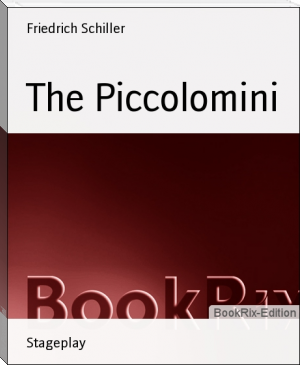

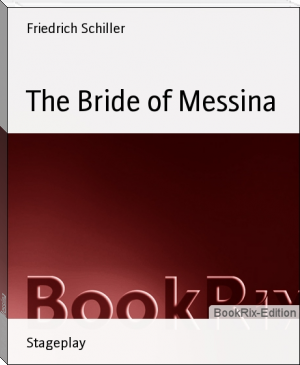
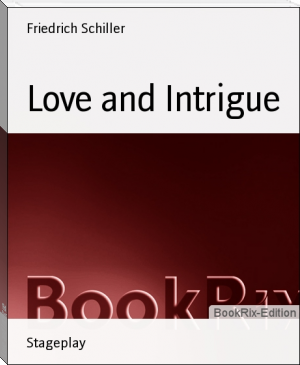
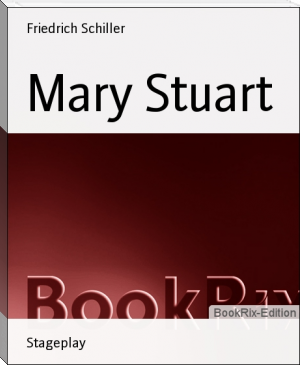
Comments (0)